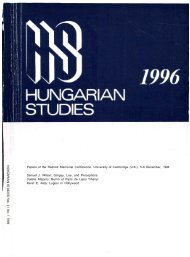The Canadian-American Review of Hungarian Studies - Vol. 4 ... - EPA
The Canadian-American Review of Hungarian Studies - Vol. 4 ... - EPA
The Canadian-American Review of Hungarian Studies - Vol. 4 ... - EPA
You also want an ePaper? Increase the reach of your titles
YUMPU automatically turns print PDFs into web optimized ePapers that Google loves.
REVIEW ARTICLE<strong>Hungarian</strong> Poetry in English Translation:Two Recent AnthologiesTimothy KachinskeHundred <strong>Hungarian</strong> Poems. Edited by Thomas Kabdebo. Manchester:Albion Editions, 1976. Pp. 125.Miklds Radnoti, Subway Stops: Fifty Poems. Translated, with anIntroduction and Notes, by Emery George. Ann Arbor: Ardis, 1977.Pp. 95.<strong>Hungarian</strong> literature has long been terra incognita to Western readers.Hungary's linguistic isolation on an Indo-European continent andher history <strong>of</strong> subjugation to outside imperial powers are <strong>of</strong>ten given asreasons. But perhaps the primary reason for Western nescience <strong>of</strong><strong>Hungarian</strong> poetry is the lack <strong>of</strong> good translation.This decade has done more than any previous decade to remedy theneglect <strong>Hungarian</strong> poetry has suffered in the West. Since 1970 individualcollections <strong>of</strong> Pet<strong>of</strong>i, Illyes, Jozsef, Radnoti, Weores, Pilinszky,Laszlo Nagy and Ferenc Juhasz have been published in North Americaand Britain. Also, during the period 1975 to 1980 no less than liveanthologies <strong>of</strong> <strong>Hungarian</strong> poetry will have been published in Englishtranslation. By and large these translations are good. A variety <strong>of</strong> translationmethods have been used. Some are done by native speakers,others by English-speaking poets and scholars who have come to know<strong>Hungarian</strong> letters, and still others are the result <strong>of</strong> collaborationbetween native-speaking <strong>Hungarian</strong>s and English-speaking poets. Thusa variety <strong>of</strong> voices in translation is afforded the reader, as well as a wideselection <strong>of</strong> <strong>Hungarian</strong> poets.Thomas Kabdebo's Hundred <strong>Hungarian</strong> Poems is an anthology thatshows such a variety <strong>of</strong> approaches to the problem <strong>of</strong> translation. <strong>The</strong>list <strong>of</strong> translators is impressive. Many <strong>of</strong> the poems in this anthology arethe result <strong>of</strong> partnership between <strong>Hungarian</strong>-speakers and English-
















